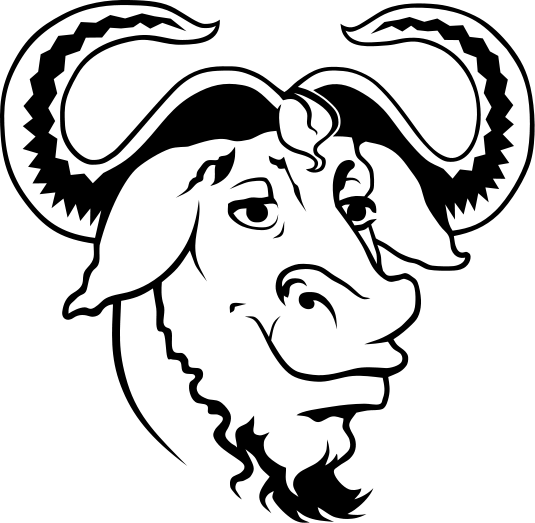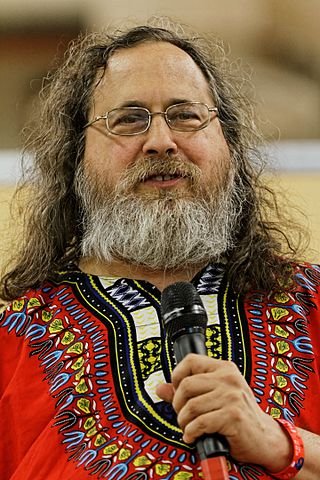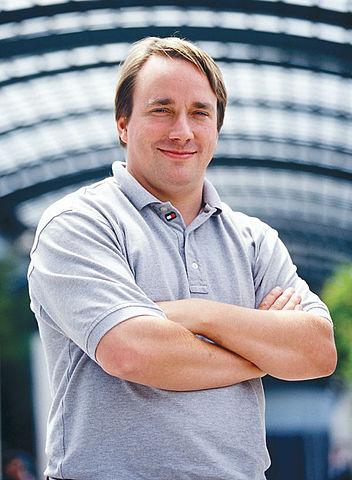
Hello Steemit,
Today I would like to post a few words about the GNU project. In another article we could already learn about FLOSS, its definition and importance. However, with this post I would like to use the chance to provide a few more details about the background of FLOSS and the GNU project which is seen by some (but definitely NOT all) free software enthusiasts as the organization providing the proverbial breeding ground for what we call the "free software movement" today.
A short history of GNU

This is a picture of Richard Matthew Stallman (RMS). He publicly announced the GNU project on September 27, 1983, whereby the name GNU is a recursive acronym for "GNU's Not Unix!". Back in 1983 RMS was working at the Massachusetts Institute of Technology (MIT) and was rather fed up with the existing proprietary Unix environment he had to deal with day in and day out. He thought that a closed system is way too restrictive for the people having to work with it and thus decided to create a free replacement for the ubiquitous Unix system. He eventually summarized his ideas in the GNU manifesto in 1985. In this manifesto he defined his ideas of what properties free software should have . In October 1985, RMS set up the Free Software Foundation (FSF). In the year 1990 the GNU project already provided all necessary tools (such as editors, terminals, etc...) to run an almost free operating system. The only thing missing was a free kernel (which can be viewed as the heart of any operating system). In order to solve this problem the GNU project and the FSF joined forces to initiate a free replacement for the Unix kernel. The proposed free kernel was called Hurd and is still being (more or less) actively being developed to this day. For several reasons (which I won't explain here as it would be way out of scope for this article) this kernel was very ambitious. It took a long time to get the development of Hurd starting and even today (after more than 27 years) there still hasn't been an official and stable release. This is partly also due to this man, Linus Torvalds.

Linus Torvalds started the development of the Linux kernel and released the first version in 1991. A friend of his took him to a lecture of RMS at his university after which Torvalds decided to release his kernel under a license of the FSF. By doing so, he paved the way for combining all existing GNU tools with his kernel, resulting in a completely free operating system. In order to give credit to the work of the GNU project, the FSF still insists to this day that this free operating system should not be called Linux but GNU/Linux instead.
The free software definition according to the GNU project
The definition of the FSF entails the four essential freedoms a software license has to fulfill in order to treat the corresponding software as free as in freedom. On its website, the FSF states:
A program is free software if the program's users have the four essential freedoms:
- The freedom to run the program as you wish, for any purpose (freedom 0).
- The freedom to study how the program works, and change it so it does your computing as you wish (freedom 1). Access to the source code is a precondition for this.
- The freedom to redistribute copies so you can help your neighbor (freedom 2).
- The freedom to distribute copies of your modified versions to others (freedom 3). By doing this you can give the whole community a chance to benefit from your changes. Access to the source code is a precondition for this.
Are there other definitions of free software?
Yes, there are some other definitions of free software. Some of those (partially) contradict and some of those embrace and extend the definition of the FSF. However, this is a different topic and would have more than enough depth to justify an additional article.
Can we think of the GNU project as a finished project?
One might think that "Ok, we have a free operating system now. Thus, the work of the GNU project is done and everything is fine". Unfortunately, nothing could be any farther from the truth. It's true that people can (if they choose to) run a GNU/Linux distribution without any proprietary components these days. The FSF provides a list of these distributions. This list shows us that GNU/Linux distributions such as Ubuntu, Linux Mint, Fedora, etc... unfortunately are not as free as many people would like to think. For each of the major distributions with freedom-related issues, the FSF provides another list explaining their reasoning behind the exclusion of those distributions.
Which obstacles still exist to complete free (operating) systems these days?
Unfortunately, there are quite a few. Without wanting to go into too many details, here is an unordered list with regard to the severity of the underlying issue:
- Most completely free GNU/Linux distributions or not very user-friendly, heavily outdated or both. In my opinion, Trisquel GNU/Linux is the only completely free distribution which at least attempts to stay up-to-date (unfortunately without succeeding). This problem results in the user's computers being vulnerable to security holes that have been fixed in more recent and updated packages.
- The Basic Input/Output System (BIOS) of most modern computers is proprietary, allowing manufacturers to hide backdoors in those parts. "What kind of conspiracy theory is that?" and "Where is your tinfoil hat?" I hear you asking. I reacted similar at first but after reading this and that I came to some different conclusions. Projects trying to fix this situation are the Coreboot project and the Libreboot, respectively.
- An issue closely related to issue 2 is the problem of some software vendors (namely Microsoft) having the theoretical power to prevent the installation of free systems by changing the BIOS in a way that could potentially disable support for some operating systems. The FSF has more on this issue.
- A lot of software is either only available for proprietary systems or proprietary itself. Free alternatives to those programs are either not available or lack behind in terms of quality due to financial restrictions.
- The hardware of every computer sold these days is proprietary. Thus, people not working for a hardware company cannot know what exactly all the components in the computer actually do.
There is a lot more to write about free software and free systems but I will try to elaborate on other issues in some upcoming posts. Stay tuned and thank you for reading.
Image references